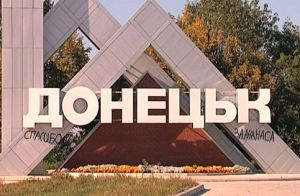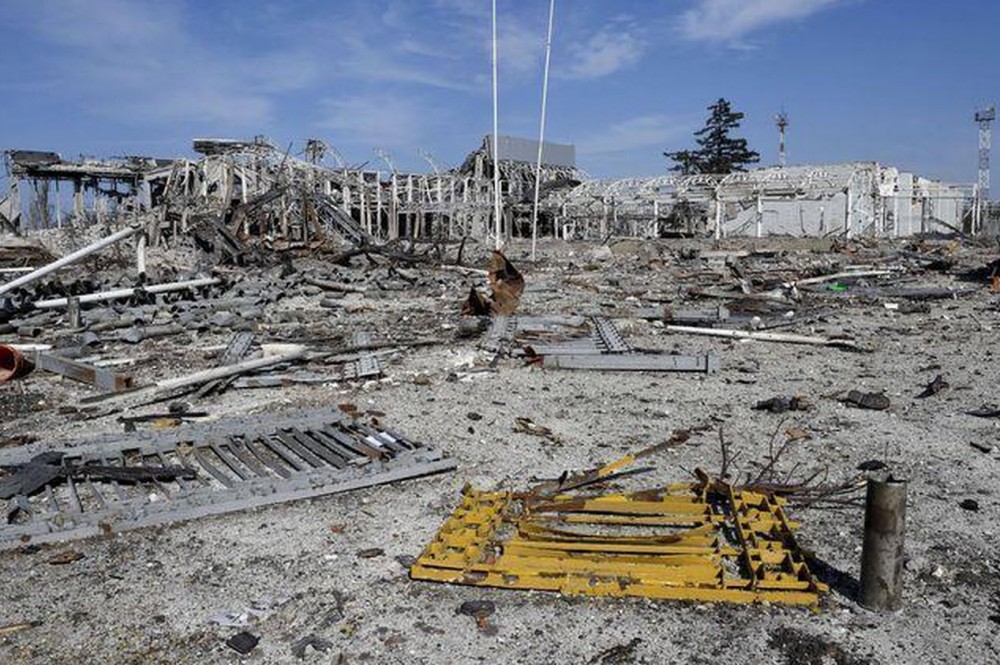Yekaternia Sergatsova
 Journalist from UP.Life Yekaterina Sergatsova talked to the Donetsk intellectuals about the reasons of what is happening in Donbas, and what awaits the region after the war is over.
Journalist from UP.Life Yekaterina Sergatsova talked to the Donetsk intellectuals about the reasons of what is happening in Donbas, and what awaits the region after the war is over.
“Donbas is a region which has definitely inherited the system of values that existed in the Soviet Union: historical paternalism, dominance of collective values, historical memory, for the most part oriented towards the Soviet heritage,” Dmitro Mironovich, culture sociologist in charge of the sociology lab in one of the Donetsk universities, begins our conversation.
According to Mironovich, such moods were beneficial for the local government: the economy of the region which had been created in the USSR has not changed. Consequentially, the lifestyle of the citizens in the region has not changed either.
The same Soviet mindsets and myths have been passed down from generation to generation. The dominant social demand was for stability and not change. Therefore, when Maidan began, the citizens of the eastern regions simply did not understand and did not accept the sense of this protest.
“Yanukovych was a factor of some stability. After the fall of his regime, a vacuum emerged in the society of Donetsk,” says social philosopher Yaroslav Pasko.
Yaroslav Pasko is the author of the book “Civil society and national idea. Ukraine in light of European processes. Comparative essays.” He thinks: the new government turned out to be alien to the residents of the Eastern regions on the level of values. Their worldview has been shaken. They immediately needed a replacement idea.
This is how the so-called People’s Republics of Donetsk and Luhansk emerged, the “governments” of which were formed from the lower classes.
“These ‘republics’ have no serious worldview basis. This is simply a reservoir, in which the energy of social irritation accumulates,” says Yaroslav Pasko.
Nobody is concerned with the fact that one of the MMM financial pyramid organisers in Donetsk Denys Pushilin became the “chairman of the high council” of the PRD, a technologist of the meat processing plant Nikolay Solntsev became a member of the PRD “government” in the ideological block, and the worker of the security service of the plant “Horlivka machine building” Igor “Bes” Bezler – a representative of the force block, the “commander of the Donetsk militia.”
A chance for self-realisation
“The format of the ‘people’s republic’ was not chosen because there were certain precepts for it, but because the people already had the example of Crimea,” confirmed Pasko. “What is more, the PRD and PRL are overall a project that has gained support from the Russian government and Yanukovych himself. The people here did not really understand what the format of the ‘republic’ meant, they viewed these formations as a simple replacement for the old government for the new one, which has no oligarchs, and all the guys are ‘ours’.”
Vladimir Podgorniy is a professor at the Donetsk Management University, who recently received his doctorate, and who became the “Minister of Economy” of the PRD. And also part of the university’s employees were involved in the process of writing the republican “constitution.”
Why was the intelligentsia involved in this process?
“It became a way to self-realisation for them, which the conditions they lived in before the revolution did not allow them: the constructed vertical government, the lack of support for initiatives,” Mironovich is convinced.
But they were unable to find a coherent sensible base for their project. Therefore they built it on antitheses: in Kyiv there was Maidan, in Donbas – Antimaidan; in Kyiv there are “fascists” – in Donbas, St. George’s Ribbons and the cultivation of the victory in World War II.
“The symbols of the Soviet era became the flesh and blood of the citizens of the region,” says Yaroslav Pasko.
And the PRD and PRL became a time machine of sorts which has send the Donbas back about half a century.
According to the philosopher, Donbas has hit a dead-end, as throughout the entire period of independence, the practice of self-government was not implemented and there were no grounds for development of lower initiatives. Therefore there was no basis for modernisation, but the vertical system, which the Party of Regions had constructed, fell apart like a house of cards.
It turned out to be very easy to make a step backwards.
“The government did not pay attention to personality, to the individual for a long time. Essentially, the individual emerges where there are grounds for civil society and freedoms. And here there was no freedom of speech, nor freedom of religion, nor private initiative,” supposes Yaroslav Pasko. “We compared the values of western and eastern Ukraine: overall, there is no normal individualism in the east, nor a strive for active collaboration among communities. The people’s values are fragmented, there is no counteraction to the active segment.”
He is convinced: no more than 20% of the population support the PRD. However, according to him, this is an aggressive minority.
Nonetheless, for some the “people’s republics” became a social lift.
Of course, under the conditions, when the regions are governed by people whose main argument are weapons, the development of any social initiatives is impossible, except for those that have to do with the activity of the “people’s republics.”
Deficit of active positions
According to the head of the Donetsk Institute for Social Investigations and Political Analysis Volodymyr Kypen, currently the citizens of the region may be united by martial law. The necessity to solve everyday problems in confined conditions will help consolidate the people’s forces and create new communities.
Kypen knows what he is talking about. He is one of the communal activists in Donetsk oblast, head of the politics department of the Donetsk National University. He investigated the history of socialism and factors of the formation of an active life position of the individual.
“In the interim period the military forms of organisation may freeze the conflict which the community is experiencing. And then, in time, we would pass to the stage of development of lower initiatives in the wider plane,” thinks the sociologist.
The government in the region, which has contributed to and supported the conflict in many ways, according to Kypen, will be unable to become the power which will be able to actively influence to alter the situation.
“The situation is very complicated. And it has to be solved, accounting for the interests of various groups, including those who support the separatist movement. They will have to speak to everyone. The local reigning class will have to give some leeway. As it is their fear before the events in Kyiv, the revolution and loss of privilege, resources, influence and business that became one of the main reasons of fuelling separatism in Donbas,” Kypen thinks.
Life after
When the war is over in the east of the country, the process of searching for a new idea able to develop the region will begin.
Philosopher Yaroslav Pasko says that by creating the image of the future, Donbas will have to account for the Soviet themes for sure.
“The citizens of Eastern Ukraine have been in a paternalistic position for a long time, therefore it is dangerous to fully ruin the worldview they are used to. We have to act carefully and not try to impose western values. But in any case, the image of Donbas’ future should not be associated with Russia as the continuation of the Soviet Union,” thinks Pasko.
In many ways this process will depend on how warmly central and western Ukraine accept the east which tried to “get away.”
Volodymyr Kyben thinks that the key factor for the regions’ movement towards each other will be the shared Ukrainian identity. It may be “We are different but united.”
“If we are able to achieve it, then we will exit the crisis with smaller losses than now,” thinks the political scientist.
Sociologist Dmytro Myronovich proposes to find the solution in the educational sphere and coherent social policies in general: “There have been no attempts to develop a mutual point of agreement for the two parts of the country. Nobody has yet engaged in, say, the creation of a history textbook which would satisfy both the East and the West. Through education it is possible to overcome many contradictions as new generations would grow up on other values.
Alas, there are no quick solutions to the problem.”
Not one year will be needed to construct new relations between the regions inside the country as well.
There are historical examples when society consciously overcame the polarisation of opinions.
A good example is Spain during Francisco Franco, thinks sociologist Myronovich. Then society divided into two camps: one supported the republic, the other – the regime of Franco the dictator. After the war, the society made a pact: “We will forget past difference, we will not mention them in public discourse and build everything from scratch. We have to go on living.”
Such a pact is necessary in Donbas, but this is not a quick process.
First and foremost, peace.
Source: UP.Life
Translated by Mariya Shcherbinina



